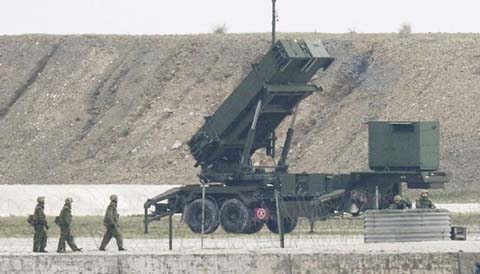
AFP, Tokyo :
Japan’s government on Tuesday approved the introduction of the US military’s land-based Aegis missile interceptor system, beefing up its defence against “serious” and “imminent” North Korea threats.
The regime in Pyongyang has fired two missiles over Japan this year and has threatened to “sink” the country into the sea.
Last month, North Korea test-fired an intercontinental ballistic missile (ICBM) that plunged into the waters of Japan’s exclusive economic zone.
“North Korea’s nuclear and missile development has entered a new stage of threat that is more serious and imminent to our country’s security,” the government said as it endorsed the introduction of Aegis Ashore at a cabinet meeting. Japan needs to drastically improve its missile defence, Tokyo added.
Japan plans to introduce the Aegis Ashore system at two locations, covering the entire nation with powerful radars. The deployment will hand the US ally another layer of defence in addition to SM-3 guided missiles launched by Aegis destroyer vessels and Patriot Advanced Capability-3 (PAC-3) missiles. However, it will take years before the Aegis Ashore system is operational, according to Japanese officials.
The contract is yet to be signed with the United States and deployment at two locations could cost a total of 200 billion yen ($1.8 billion), including the cost of building new facilities.
However, officials insisted the new system would boost Japan’s missile defence.
“Naval vessels need to return to their ports regularly for rest and refuelling, but if it’s ground deployment, we will be able to operate almost 24-7,” an official said.
“We can be on permanent vigilance even when signs (of missile firing) are hard to detect,” he said.
Japan is reportedly planning a record $46 billion defence budget for the next fiscal year in the face of the North Korean threat.
Defence Minister Itsunori Onodera said this month the country also plans to purchase long-range cruise missiles from US firms with a range of some 900 kilometres (560 miles).
The move would be controversial as Japan’s pacifist constitution bans the use of force as a means of settling international disputes.
U.S. allies Japan and South Korea urged China to do more to get North Korea to end its nuclear and missile programmes, Japanese Foreign Minister Taro Kono said on Tuesday amid a tense standoff between North Korea and the United States.
Reclusive North Korea has boasted of developing a missile capable of carrying a nuclear warhead and reaching the mainland United States in defiance of U.N. Security Council resolutions and international condemnation, including from its lone major ally, China.
“We agreed that it is necessary to ask China to play even more of a role,” Kono said after talks with South Korean Foreign Minister Kang Kyung-wha.
Kono said China was implementing Security Council resolutions on North Korea but said it could do more, including adding “pressure” on Pyongyang.
North Korea has regularly threatened to destroy the United States, Japan and South Korea and has fired missiles over Japan in recent tests. China routinely says it is meeting its Security Council obligations on North Korea and urges “all sides” in the dispute to pursue dialogue. The United States has also pressured China and other nations to cut trade and diplomatic ties with North Korea as part of international efforts to dry up Pyongyang’s illegal cash flows that could fund its weapons programmes.
The U.S. Navy’s top officer said on Tuesday said that vessels from eastern Pacific could be brought forward to reinforce U.S. naval power in Asia as Washington contends with increased threats in the region. North Korea has defended its weapons programmes as necessary to counter U.S. aggression and sees the military drills the United States holds with South Korea and Japan as preludes to invasion. The United States stations 28,500 troops in the South, a legacy of the 1950-53 Korean War.
China and Russia have proposed that the United States and South Korea stop major military exercises in exchange for North Korea halting its weapons programmes.
U.S. President Donald Trump and North Korean leader Kim Jong Un have exchanged bellicose rhetoric in recent weeks, with Trump threatening to destroy North Korea if provoked, while U.S. diplomats have stressed the importance of diplomacy.
Trump on Monday unveiled a new national security strategy, again saying Washington had to deal with the challenge posed by North Korea.
Japan and South Korea are seeking to boost cooperation over North Korea, despite lingering tension between them over the issue of “comfort women”, a Japanese euphemism for women – many of them Korean – forced to work in Japanese military brothels before and during World War Two.
Researchers say a series of recent cyber attacks has netted North Korean hackers millions of dollars in virtual currencies like bitcoin, with more attacks expected as international sanctions drive the country to seek new sources of cash.

